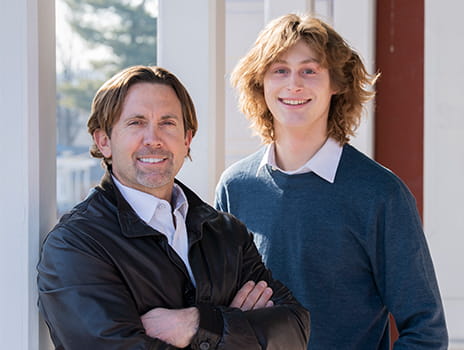May 17, 2019
Blake Conner was thrilled when his older brother, Brendan, found a matched donor and received a new kidney in September 2017. But his and his family's joy weren't yet complete. Both brothers were born with Alport syndrome, and Blake needed a kidney, too.
Chronic Alport syndrome leads to kidney failure, requiring dialysis or transplant. The Conner brothers managed the condition for years by carefully monitoring their diets and reducing their potassium and phosphorous intake. They were students and athletes, with Blake cultivating a love of baseball and talent on the pitcher's mound.
Blake's passion for baseball proved rewarding in multiple ways. He became close friends with the son of his Little League coach, Colby Horn, a man who would become a friend, father figure and – eventually – Blake's living kidney donor.
When Blake entered Maple Woods Community College, his kidney function fell to 12%, considered stage 5 kidney failure. His need for a new kidney was urgent.
The transplant journey
Blake's care team at The University of Kansas Health System placed him on the organ transplant waiting list. But patients can receive treatment faster and do better for longer when healthy kidneys are provided by living donors.
Blake's family began the tough task of seeking a donor. They used language from the National Kidney Foundation's "Big Ask, Big Give" campaign in a Facebook post, as Brendan had done. Meanwhile, Colby called the health system transplant team and asked for an evaluation. He didn't tell Blake.
"I've known Blake for more than 11 years," Colby says. "He's spent as much time at our table as he has at his own. He's like a son to me, and if I could do this for him, I knew I would."
Colby proved a match and was ready to schedule immediate surgery, but the transplant team required further testing. Colby's physical ability to donate was important, but so was his psychological readiness.
Potential donors meet with a living donor advocate and a licensed social worker, as the health system evaluates the medical and psychosocial status of each candidate.
"I was ready to move, but the team was extremely thorough," says Colby, who ensured his family supported his decision.
An emotional talk
Once Colby was fully approved, it was time to share the news with Blake. Colby invited him over to talk.
"It was a bit emotional, but also exciting," Colby says. "I sat him down and told him, 'They tell me you need a kidney and that mine will work for you.' He was completely surprised. He said, 'I know I shouldn't accept this, but I know you, and I know you're going to do what you want to, so thank you. Thank you.' We planned the surgery."
Successful surgeries
On May 29, 2018, physicians removed a kidney from Colby and transplanted it into Blake. The gift gave Blake a new chance at living the full and active life he wants. Both are doing well.
"What Colby did for me is such an important reminder to be thankful for what's given to you in life," Blake says. "He motivates me to do my best at everything I do. Life is such a gift."
Mutual rewards
Colby is grateful he had the opportunity to support Blake's return to good health.
"If you have the opportunity to bless someone with the gift of life, I guarantee it will be an even greater blessing to you," he says.





